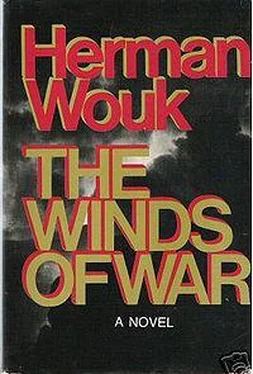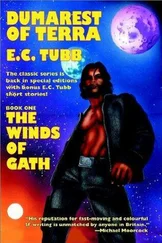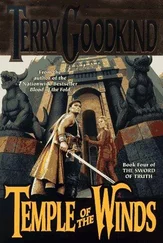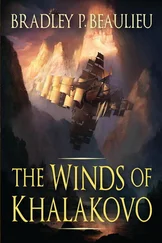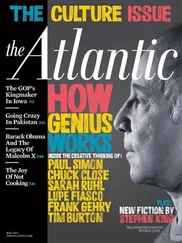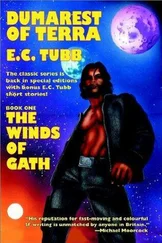Herman Wouk - The Winds of War
Здесь есть возможность читать онлайн «Herman Wouk - The Winds of War» весь текст электронной книги совершенно бесплатно (целиком полную версию без сокращений). В некоторых случаях можно слушать аудио, скачать через торрент в формате fb2 и присутствует краткое содержание. Год выпуска: 1971, Издательство: Collins, Жанр: Историческая проза, на английском языке. Описание произведения, (предисловие) а так же отзывы посетителей доступны на портале библиотеки ЛибКат.
- Название:The Winds of War
- Автор:
- Издательство:Collins
- Жанр:
- Год:1971
- ISBN:нет данных
- Рейтинг книги:4 / 5. Голосов: 1
-
Избранное:Добавить в избранное
- Отзывы:
-
Ваша оценка:
- 80
- 1
- 2
- 3
- 4
- 5
The Winds of War: краткое содержание, описание и аннотация
Предлагаем к чтению аннотацию, описание, краткое содержание или предисловие (зависит от того, что написал сам автор книги «The Winds of War»). Если вы не нашли необходимую информацию о книге — напишите в комментариях, мы постараемся отыскать её.
About the Author
Herman Wouk's acclaimed novels include the Pulitzer-Prize winning
;
;
;
;
;
; and
.
The Winds of War — читать онлайн бесплатно полную книгу (весь текст) целиком
Ниже представлен текст книги, разбитый по страницам. Система сохранения места последней прочитанной страницы, позволяет с удобством читать онлайн бесплатно книгу «The Winds of War», без необходимости каждый раз заново искать на чём Вы остановились. Поставьте закладку, и сможете в любой момент перейти на страницу, на которой закончили чтение.
Интервал:
Закладка:
Roon’s summaries from his second volume have recently appeared in Germany under the title World Holocaust. Analyzing mainly Germany’s defeats and downfall, it has not been much of a success.
His concluding estimate of Hitler overlooks one or two small points. This able and resolute homicidal maniac, using modern German as her murder instrument, directly caused between twenty-five and thirty-five million human deaths; the exact figure will never been known. To stop him cost the world billions, maybe trillions, of dollars. Had the German people shut this strange individual away in an insane asylum, instead of setting him up as their adored leader and throwing their full strength behind him for twelve years, these deaths and this waste would not have occurred.
On the historical record Adolf Hitler was certainly the worst liar, doublecrosser, destroyer, and mass murderer in the world’s annals. Roon might have mentioned these facts among Hitler’s blemishes. — V.H.
Chapter 63
The door stood open to Natalie’s bedroom, and Hitler’s screeching woke the baby. In the sitting room Natalie had the radio turned low, but at the Führer’s sudden shriek — “ROOSEVELT!” — she and Aaron looked at each other in alarm, and Louis began sobbing.
“He is a maniac, after all.” Slumped in an armchair in a bathrobe and muffler, his sunken red-shadowed eyes watering, Aaron Jastrow shook his head and lifted a trembling teacup to his mouth, as Hitler went on with his hoarse bellows, sneers, whispers, and yells. “Extremely clever, persuasive, and forceful, but a maniac. I confess I never grasped it before. I thought he playacted.”
With a faintly contemptuous glance at her uncle, Natalie went to the baby.
The Führer’s speech, starting with the usual complaints of injustices endured by Germany and himself, had worked up to the naming of the one supreme war criminal responsible for all the bloodshed and misery that he, the Führer, had worked so hard to avert, the insane hypocrite who had sold out his country and himself to the Jews, thwarted Germany at every turn, and loosed destruction on mankind. After a strangely long pause, came the wild scream that woke the child: “ Rooo-ss-felt! ”
And this bitter hate-filled animal cry somehow woke Aaron Jastrow, too.
In recent years, Jastrow had listened to few Hitler speeches. They bored him. He was a historian, and history’s pages were crowded with such flamboyant tyrants who had strutted their brief seasons, done their damage, built their grandiose monuments, and passed away. So it would be with Hitler, he had once written after a visit to Germany, in a cool meditative essay in Harper’s entitled “Der Führer: Thoughts Before Midnight.”
In this essay, Jastrow had pigeonholed the Nazi boilup with other brief violent mass upheavals which through the ages had come and gone. Sometimes they changed the order of things, like the Crusades and the French Revolution; sometimes they left only destruction, like the flash-flood massacres of Alaric and Tamerlane. Perhaps this weirdly glorified little beggar had something to contribute to the world. His call for a new unified order in Europe made a certain sense. He might start a world war; he might win it or he might lose it; but in any case he would at last die, and the world would wag on.
God — Jastrow used the term with arch irony to denote the blind drift of events — like a good roadside juggler, did his act with whatever objects came to his hand. If Hitler triumphed and brought a tyrannic German unity to Europe, or even to the whole earth, lasting a century or two, perhaps that meant he had been needed at this time on our tiny earth. What happened, after all, was only what had to happen. There were no dice in heaven. The human spirit in its unending quest for freedom would either soften and tame its Teuton masters at last, or would crack the prison of tyranny, as a grass blade cracks a concrete pavement.
Having thus boxed the German dictator away in some neat paragraphs, Aaron Jastrow had mentally shelved the man. Hitler broke from Aaron Jastrow’s mental box on this day, with his scream of Roosevelt’s name.
As the dictator went on with his long, almost raving, yet mordant comparison between Roosevelt and himself — he the poor son of struggling parents, Roosevelt the pampered only child of a millionaire; he the common soldier of the First World War, enduring rain and gunfire and muck for four years, Roosevelt the highborn insider, enjoying a safe cushy desk job in the Navy Department; he the gassed veteran, lying penniless in a hospital, Roosevelt the tricky postwar financial speculator doubling his inherited wealth; he the restorer and rebuilder of a defeated, prostrate nation, Roosevelt the economic tinkerer, the wrecker of a rich country with his crackpot New Deal schemes; he the valiant righter of old wrongs, the messianic unifier of Europe, Roosevelt the master war criminal, seeking to stave off the future and preserve the world hegemony of the Jews — listening to this ferocious, crazed, queerly coherent fantasy, Aaron Jastrow wavered in his philosophic stance, and finally became scared.
The Italians had already cancelled the exit visas of Americans. The chargé had told Jastrow that this was just a precautionary move, and that they should still plan to leave on the fifteenth if meantime war was not declared. For days Jastrow had slept and eaten little. Now Hitler’s speech, as he listened, seemed to be clanging shut an iron door.
“Well?” Natalie said, carrying in the blanket-wrapped squalling baby. “Is there any hope?”
“He hasn’t declared war yet. Not in so many words.”
In an absent practiced way, without much effort at modesty, she opened her sweater, suit jacket, and blouse, flashed a white breast, and drew the brown sweater over the baby. “Why is it so much colder in this room? It’s icy, and the more -”
Jastrow put a finger to his lips. Hitler was whipping himself up to a crescendo. His audience, hushed for a long time, broke out in applause, cheers, and roars of “ Sieg Heil! ”
“Now what was that, Aaron?”
Jastrow raised his voice over the raucous noises of the crowd. “I’m afraid that was it. He said he’s called in the United States diplomats and given them their papers. That started the cheering.”
“Well, all I can say is, I couldn’t be less surprised.” Natalie stroked the baby’s cheek with a finger, and dolefully smiled as it quieted and began sucking. “You’re just hungry, monkey, aren’t you?”
Her uncle said, “Mussolini still has to talk. We’ll know in another hour or so.”
“Oh, Aaron, what choice has he?”
He shut off the radio. “Well, that’s that. I believe I’ll have a glass of sherry. You, too?”
“No, no. I’d better keep my wits about me today, what’s left of them.”
Jastrow poured and gulped a glassful, then took another, and shrank in his armchair, sipping it, looking vacantly around at the high long frigid room piled with suitcases and wooden boxes. The hotel was silent and the street outside was silent.
“Don’t despair, Natalie. In 1939 Il Duce did manage to squirm out of it, you know. He’s no use to Hitler militarily.
The Italians are sick and sour and beaten. If he declares war against the United States, he might be assassinated, and Hitler surely doesn’t want that. Besides, he’s wily. He may well find some weaseling formula, and we may yet be on that plane on the fifteenth.”
“Oh, Aaron, quit it, for God’s sake. He’ll declare war.”
Jastrow sighed heavily. “I suppose so. Natalie, I’m sorry, deeply and tragically sorry.”
She held up a hand, palm out. “No, no. Don’t. What’s the use?”
Читать дальшеИнтервал:
Закладка:
Похожие книги на «The Winds of War»
Представляем Вашему вниманию похожие книги на «The Winds of War» списком для выбора. Мы отобрали схожую по названию и смыслу литературу в надежде предоставить читателям больше вариантов отыскать новые, интересные, ещё непрочитанные произведения.
Обсуждение, отзывы о книге «The Winds of War» и просто собственные мнения читателей. Оставьте ваши комментарии, напишите, что Вы думаете о произведении, его смысле или главных героях. Укажите что конкретно понравилось, а что нет, и почему Вы так считаете.
